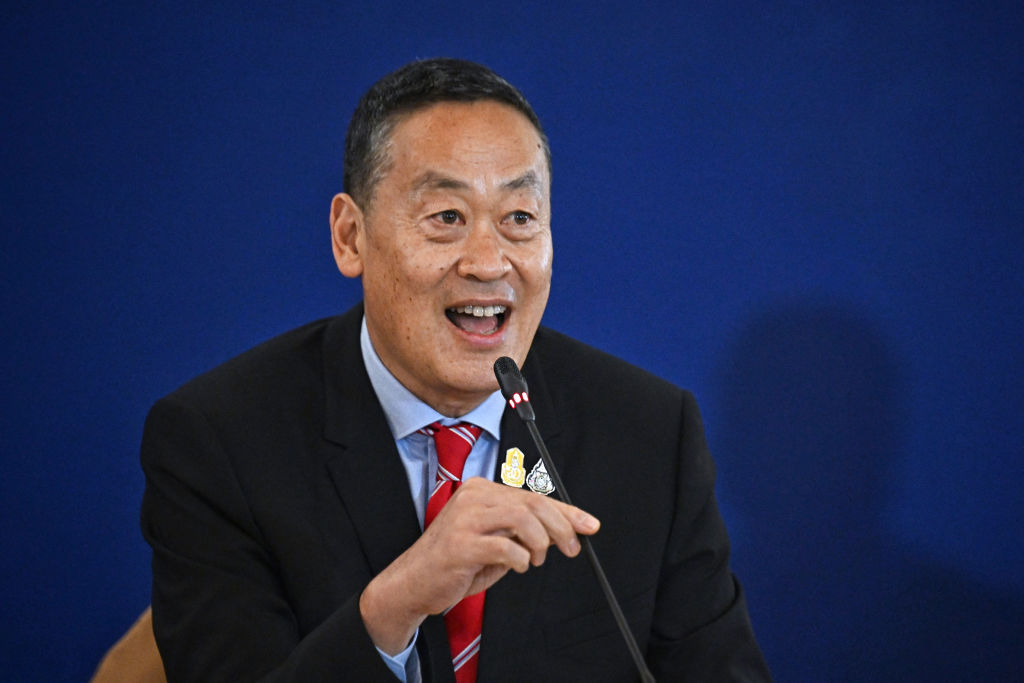
Thailand’s Prime Minister Srettha Thavisin will dole out almost $14 billion in cash handouts as his government seeks to jumpstart growth in an economy that’s lagged behind most countries in Southeast Asia.
Read More: 5 Takeaways from TIME’s Conversation with Thai Prime Minister Srettha Thavisin
The program, which gives 10,000 baht ($275) each to 50 million Thais via a digital wallet in the fourth quarter, was finalized by a committee led by Srettha this week. It comes after months of delays and disputes with the opposition and the central bank over how the ruling coalition’s flagship program should be funded.
Government officials are optimistic, saying the handouts could bump up growth by as much as 1.8 percentage points. It’s not the only stimulus measure that Srettha had in mind. He’s unveiled property sector incentives and increased government spending to chase a growth target of 5% for Southeast Asia’s second largest economy.
Last year’s economic expansion stood at 1.9%, extending a decade of average sub-2% growth.
Srettha, who doubles as finance minister, got the cash handouts funded by the budget and loans from a state lender. The Bank of Thailand, which kept rates on hold for a third straight time, said it is concerned with risks from the financial stimulus.
What’s the digital wallet scheme?
The digital wallet was first pitched by Srettha’s Pheu Thai Party before the general election. The cash handouts were touted as a strategy to “resuscitate” the economy from a decade of low growth under the military-backed rule.
Some 76% of Thailand’s 60 million population will get the funds through a digital wallet application. The program targets adults earning no more than 70,000 baht a month and they should have less than 500,000 baht in their bank accounts.
Is there a timeline for the handout?
The cabinet needs to approve the program after a committee headed by Srettha finalized it on Wednesday. Eligible beneficiaries and small retailers can register for the program in the third quarter of this year with the money being available for spending over the next two quarters.
How can beneficiaries spend the cash?
They can’t simply spend the money. The main idea of the digital wallet was to spread the cash evenly across the economy. So the beneficiaries need to spend the money within six months in the area where they are domiciled and they can buy goods from small shops registered under the program. Also, buying alcohol, cigarettes, fuel and online purchases aren’t allowed.
Participating shops can use the money generated from the program in a second round with no restrictions.
How’s the wallet funded?
The government has flip-flopped over the funding mechanism, dragging the issue for months. Pheu Thai had proposed for the program to be funded through the budget but Srettha’s coalition government opted to propose a special parliament bill to request for one-time borrowing.
It was met with opposition from the central bank, a group of economists and the main opposition party on the grounds that it could run afoul of various laws and there was no basis to justify such a stimulus. In the end, the Srettha-led committee opted for a combination of budget support and loan from state-owned Bank for Agriculture and Agricultural Cooperatives.
Some 175 billion baht will come from spending tweaks to the budget for the current fiscal year while another 152.7 billion baht will be raised from the 2025 budget. The agriculture bank will contribute 172.3 billion baht and pay directly to about 17 million beneficiaries who are mostly farmers.
What’s the impact on economy?
The Finance Ministry expects the cash handouts to add between 1.2 to 1.8 percentage points to the gross domestic product and propel growth next year to 5%. The additional financial burden is seen pushing up the public debt-to-GDP ratio to 66.9% in 2025 and the fiscal deficit to 4.42% of GDP in the new fiscal year starting Oct. 1.
Who are the likely winners of the wallet?
Companies running convenience stores, supermarkets and hypermarkets such as CP All Pcl, its unit CP Axtra Pcl and Berli Jucker Pcl are seen as major beneficiaries of the cash splurge, according to InnovestX Securities Pcl. The brokerage also expects an indirect benefit to all the players in the retail sector as consumers gain more purchasing power.
More Must-Reads from TIME
- Why Trump’s Message Worked on Latino Men
- What Trump’s Win Could Mean for Housing
- The 100 Must-Read Books of 2024
- Sleep Doctors Share the 1 Tip That’s Changed Their Lives
- Column: Let’s Bring Back Romance
- What It’s Like to Have Long COVID As a Kid
- FX’s Say Nothing Is the Must-Watch Political Thriller of 2024
- Merle Bombardieri Is Helping People Make the Baby Decision
Contact us at letters@time.com